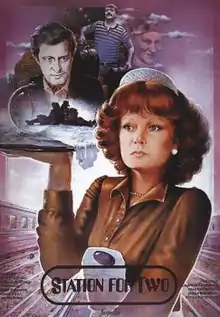Station for Two
Station for Two (Russian: Вокзал для двоих, romanized: Vokzal dlya dvoikh) is a 1983 Soviet romantic comedy directed by Eldar Ryazanov. The film became the Soviet box office leader of 1983 with a total of 35.8 million ticket sales. It was entered into the 1983 Cannes Film Festival.[1]
| Station for Two | |
|---|---|
 1983 English film poster by Aleksandr Makhov | |
| Directed by | Eldar Ryazanov |
| Written by |
|
| Starring | |
| Cinematography | Vadim Alisov (born 20.02.1941 Kiev, Ukraine- died 09.05.2021 Moscow, Russia) |
| Edited by | Valeriya Belova (born 14.12.1938, Moscow, Russia) |
| Music by | Andrei Petrov |
| Distributed by | Mosfilm |
Release date |
|
Running time | 141 min. |
| Country | Soviet Union |
| Language | Russian |
Plot summary
There are three main heroes in this movie: Vera, a waitress; Platon, a pianist; and ... a train station where these two people met. The differences in the heroes' characters and professions, the plight that Platon found himself in (he is to be arrested and undergo trial) trigger a host of both amusing and sad situations which serve as a backdrop for their unfolding love. Platon is innocent of the crime he is accused of. He simply took the blame for his wife's driving over a pedestrian. But this is known only to Platon's wife and Vera in whom he confided. However, after the verdict has been passed, Platon's life is of no interest to his wife, although Vera is ready to wait for his release.
Ideas for the filming
The script (the beginning and the end of the movie) is based on two real stories from the life of well-known people – the composer Mikael Tariverdiev and the poet Yaroslav Smelyakov.
The idea was given to the authors by Tariverdiyev. During the trip on his car, he took the passenger's seat and had one of the famous actresses drive his car. Unfortunately, it ended tragically. They had an accident and a pedestrian died. The composer decided to take the blame on himself to save the woman. There was a very long legal process that lasted about two years. Mikael was found guilty, but he was saved by amnesty. However, the affair with that woman did not last long.
The second story, which happened with the poet Smelyakov, was used in the ending of the film. He was arrested in the early 1950s and was sent to the Arctic Circle. In 1953, he was given a day off to meet his friends. The next morning after the feast friends woke up late and overslept the roll-call. Delay for the roll-call was equated with the escape. So, Smelyakov and his friends had to run a few kilometers along the snow-covered tundra to the camp. Towards the end of the road, his friends had to drag him up to the very gates of the camp, as he was too tired.[2][3]
Cast
- Lyudmila Gurchenko as Vera Nikolayevna Nefyodova, waitress
- Oleg Basilashvili as Platon Sergeyevich Ryabinin, pianist
- Nikita Mikhalkov as Andrey, conductor
- Nonna Mordyukova as "Uncle Misha", a speculator
- Mikhail Kononov as Nikolasha, militiaman
- Anastasia Voznesenskaya as Yuliya, on duty at the hotel
- Aleksandr Shirvindt as Shurik, pianist
- Tatyana Dogileva as Marina, on duty at the hotel
- Olga Volkova as Violetta, waitress
- Raisa Etush as Lyuda, waitress
- Viktor Bortsov as drunken visitor restaurant
- Anatoli Skoryakin as commandant
- Stanislav Sadalsky as drunk man with a carburetor
- Alla Budnitskaya as Masha, Platon's wife
- Eldar Ryazanov as Railroad Supervisor
References
- "Festival de Cannes: Station for Two". festival-cannes.com. Retrieved 2009-06-17.
- "Почему Эльдар Рязанов снял "Вокзал для двоих"".
- "Вокзал для двоих. История создания".
External links
- Station for Two at AllMovie
- Station for Two at IMDb
- Trailer and Screenshots